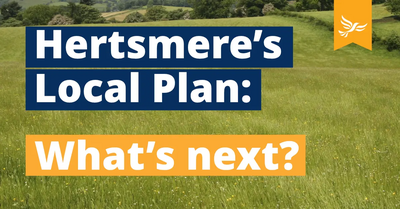Hertsmere Council leaders have been forced to ditch their draft Local Plan after residents filed a staggering 20,000 objections during the public consultation.
For now, this is the best outcome. Their plan - for future development and house-building - would have been a catastrophe for our community.
Council leaders had intended to destroy nearly ten per cent of the borough's greenbelt, to build 12,200 new homes - the vast majority unaffordable. It was a plan obsessed with reckless economic growth at huge environmental cost. A plan to please greedy developers - and impress government ministers - but where the feelings of residents counted for nothing.
That's why - right from the start - we called for a total rethink.
The plan was only stopped thanks to courageous campaigning by local residents. But while this particular scheme has now been spiked, the Local Plan process has not. It's only paused, not cancelled - and we need to think clearly about what lies ahead.
Within the next couple of years, Hertsmere will still have a Local Plan. It's a government requirement to put one in place - and so's the obligation to meet housing targets.
This means thousands of new houses will still be built. At least some greenbelt will still be lost.
But if managed responsibly, and driven by the right principles, it's possible to produce a plan with development on a much smaller scale - where greenbelt protection is the first principle, and home-building's focussed on social need, not profit.
To achieve this, the government must be challenged on housing targets. But even existing targets should be revisited and new projections drawn up - and with a presumption in favour of greenbelt, not developers: the opposite of what happened last time.
So far, council leaders have been very hazy about what they'll do next. There's been vague talk of reducing the borough's housing targets and then drawing up a new plan. But they've made no commitments about their strategy, intent, or timescale.
Importantly, none of the proposed development sites have yet been definitely saved. The Bushey sites for example - Farm Way, Harts Farm, Bushey Mill Lane, and Heathbourne Road - now have a better chance of escaping development, but no more that that. Nothing has specifically been ruled out.
All of which means opposition councillors and residents' groups must continue working together to scrutinise the process and keep the pressure on council leaders.
And as Lib Dems, we'll do everything in our power to hold the executive to account and increase our influence in the council chamber.
Make no mistake, Conservative council leader Morris Bright and planning chief Harvey Cohen did not want to scrap their original plan for 3,000 acres of greenbelt loss - a plan described by the Campaign for the Protection of Rural England as "pursuing a developer-led economic growth agenda'[and] ignoring critical environmental implications".
Cllrs Bright and Cohen devised this plan, boasted about it, promoted it, and were proud of it. For weeks, they aggressively defended it from all forms of criticism. And despite repeated calls to halt the process, they ploughed on - with the whole operation costing, it's suggested, nearly a million pounds.
Eventually, they were defeated by the sheer scale of the opposition - but now, as things stand, these same two politicians will oversee the new plan.
The question is - can you trust them to do the job? Are they the right people to protect our greenbelt? Will they prioritise the needs and views of local residents - or developers and economic growth ? And will they really stand up to their party colleagues at Westminster to get a better deal on housing targets, having never done so before?
Residents already fear that council leaders will settle for a slight reduction in numbers, remove a couple of high-profile sites, and then present essentially the same plan as something new and radically altered.
They may also be able to use a legal technicality to avoid public consultation on whatever scheme they next propose.
And most likely, they'll conceal their new plans until after the next council elections, in May 2023, in the hope that residents simply forget about the whole thing. However, those same elections also give residents an opportunity to put different people in charge of the process.
As mentioned, it was the extraordinary response by residents to the autumn 2021 consultation which forced Hertsmere chiefs to abandon their disastrous original plan.
A staggering 20,000 objections were made - testament to the sheer level of anger in dismay. And across Hertsmere, neighbourhood campaign groups worked tirelessly to raise awareness.
Altogether, a deafening message was sent out: Hertsmere residents will not be taken for fools. You will fight to protect your greenbelt. And you still stand up for what you believe to be right.
The stakes remain as high as ever. The very future of our community is still to be decided.
Over the next few weeks, we - as Lib Dem councillors - will set out a prospectus for the new Local Plan - the principles and key objectives we will seek.
These will include reducing housing targets, far stronger greenbelt protection, a much higher proportion of truly affordable new housing, more stringent action on the climate crisis, and firmer guarantees on improved public transport.
We will welcome your input and thoughts.


